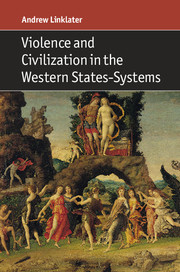Book contents
- Frontmatter
- Epigraph
- Contents
- Preface and Acknowledgements
- Introduction
- 1 The Hellenic City-States System
- 2 New Territorial Concentrations of Power in Antiquity
- 3 The International Relations of Latin Christendom
- 4 The Renaissance City-State System
- 5 The European States-System and the Idea of Civilization
- 6 Cruelty and Compassion in the Age of Empire
- 7 Enlightenment Thought and Global Civilization
- 8 Total Warfare and Decivilizing Processes
- 9 Modernity, Civilization and the Holocaust
- 10 Sovereignty, Citizenship and Humanity in the Global Civilizing Process
- 11 Process Sociology, Civilization and International Society
- Conclusion
- Bibliography
- Index
3 - The International Relations of Latin Christendom
Published online by Cambridge University Press: 28 March 2017
- Frontmatter
- Epigraph
- Contents
- Preface and Acknowledgements
- Introduction
- 1 The Hellenic City-States System
- 2 New Territorial Concentrations of Power in Antiquity
- 3 The International Relations of Latin Christendom
- 4 The Renaissance City-State System
- 5 The European States-System and the Idea of Civilization
- 6 Cruelty and Compassion in the Age of Empire
- 7 Enlightenment Thought and Global Civilization
- 8 Total Warfare and Decivilizing Processes
- 9 Modernity, Civilization and the Holocaust
- 10 Sovereignty, Citizenship and Humanity in the Global Civilizing Process
- 11 Process Sociology, Civilization and International Society
- Conclusion
- Bibliography
- Index
Summary
Leaving aside a small elite, rapine, pillage and murder were standard practice in the warrior society of (the) time … Outbursts of cruelty did not exclude one from social life. They were not outlawed. The pleasure in killing and torturing others was great, and it was a socially permitted pleasure. To a certain extent, the social structure even pushed its members in this direction, making it seem necessary and practically advantageous to behave in this way
(Elias: 2012: 189)The medieval political order did not consist of relatively autonomous political units that were bound together by shared understandings about standards of restraint that can be found in the international states-systems of antiquity, or the Italian Renaissance city-states system, or the modern global figuration of sovereign political communities. As a result of identification with the societas christiana, ‘unity rather than separateness’ – ‘hierarchy rather than equality’ – characterized relations between the constituent units (Wight 1977: 25–7). So powerful were we-feelings organized around the idea of ‘the normative unity of the Christian world’ that the physical ‘separation … into kingdoms and duchies was considered illegitimate by most and epiphenomenal even by the temporal rulers who benefited from it’ (Fischer 1992:435–6). If there was a medieval states-system, it consisted of the ‘triangular relationship between Eastern Christendom, Western Christendom and the Islamic world’, but one that was complicated by the reality that none of those political entities formed a ‘singular power-bloc’ (Wight 1977: 25). Latin Christendom is perhaps best regarded as a ‘uniquely complicated dualistic or double-headed suzerain state-system’ in which the empire and papacy asserted rival claims for authority over the subordinate parts (Wight 1977: 29). Many of those actors would go onto assert and acquire rights of sovereignty that altered the we–I balance between Latin Christendom and particular ‘survival units’. During the wars of religion, the restraining effect of earlier shared universal convictions declined sharply (Phillips 2011: chs. 4–5). Prior to that era, the papacy came closest to displaying the basic hallmarks of a state (Wight 1977: 28; also Davies 2003; Reynolds 1997, 2003 and Larkins 2010).
- Type
- Chapter
- Information
- Violence and Civilization in the Western States-Systems , pp. 106 - 149Publisher: Cambridge University PressPrint publication year: 2017



